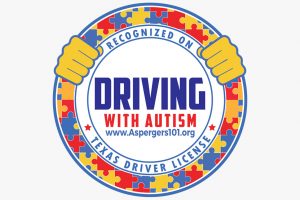The Texas Department of Public Safety will begin training officers on how to interact with people with autism, one of several initiatives the agency announced Monday to help with traffic stops involving motorists with communication difficulties.
The agency also will expand the definition of “communication impediment,” a notation that appears on driver licenses if a person chooses. The notation previously was aimed at protecting deaf people, but now will be available for those on the autism spectrum.
Maj. Jason Hester, of the DPS Education, Training and Research Division, said the department did not see a specific need for the program before being approached by Aspergers101, an advocacy group on the communication impediment.
“We don’t have any documented incidents,” Hester said. “However, we just think that it was a great initiative to have the additional information, to have that out there. We have a responsibility to provide for a safer Texas.”
Samuel Allen, who is 21 and has autism, said people with communication impediments may not understand figures of speech and could react to a police officer in a way that he could see as disrespectful.
“Learning to drive can be a very scary concept, and especially moreso if you have high-functioning autism or Aspergers,” said Samuel Allen, the son of Aspergers101 founder Jennifer Allen. “I feel protected knowing that ‘communication impediment’ is printed on my driver’s license.”
Aspergers101 also is collaborating with the agency in providing “Driving with Autism” summer camps to help people with communication difficulties learn how to drive and interact with police officers.
Ron Lucey, executive director of the Governor’s Committee on People with Disabilities, voiced his support for the initiatives, saying they can help people with autism be more “transportation independent.”
“This initiative is both good for public safety, but especially for Texans for disabilities,” Lucey said. “In order for Texans with
disabilities to fully participate in the economic and social life of our state, they need access to convenient transportation, just as any other Texan would need.”
The Department of Public Safety currently does not conduct training on how to interact with people who speak no English or Spanish. Officers typically use “non-verbal communication” if a situation arises where the person is a non-English or non-Spanish speaker, DPS spokesperson Tom Vinger said.
There will be “little to no cost,” for the state to implement the new programs, said Joe Peters, the assistant director of the DPS driver license division. Peters said he does not know the number of drivers with autism in Texas.

Suzanne Potts, executive director of the Central Texas Autism Society, lauded the DPS moves, saying her group is seeing more adults with autism getting behind the wheel.
“Anytime we can inform public safety officers about autism, it’s a good thing,” she said. “I think it’s just notable that DPS took the initiative to create this.”
Dennis Borel, executive director of the Coalition of Texans with Disabilities, said he was pleased to hear of the initiative.
“This is smart law enforcement, smart public policy,” he said. “Of course, autism does have an impact on communication skills, and for officers to recognize this and communicate in the most effective manner, like in a traffic stop, that’s a win-win situation.”
By Samantha Ketterer
Houston Chronicle – April 25, 2016
Learn more about AS101’s “Driving with Autism” here!
Please consider donating to help support this initiative.
“Driving with Autism” is an Asp ergers101 ongoing series that educates and empowers the driver diagnosed with High-Functioning Autism or Asperger’s Syndrome. Aspergers101 has teamed up with the Texas DPS in training Texas State Troopers about the uniqueness of Autism and understanding the Autistic driver. This partnership is garnering encouraging results.
ergers101 ongoing series that educates and empowers the driver diagnosed with High-Functioning Autism or Asperger’s Syndrome. Aspergers101 has teamed up with the Texas DPS in training Texas State Troopers about the uniqueness of Autism and understanding the Autistic driver. This partnership is garnering encouraging results.
A graduate of Abilene Christian University, Jennifer had a long career in TV Broadcasting. Upon learning her oldest son Sam had a form of Autism called Asperger’s Syndrome, she left her career and became a full-time mother to both of her sons. Jennifer elicited the participation of her family and together they produced several independent programs including a children’s animated series titled Ameriquest Kids, as well as a documentary and book titled, Coping to Excelling: Solutions for School-age Children Diagnosed with High-Functioning Autism or Aspergers Syndrome. She formed the nonprofit Asperger101 to provide on-going free resources related to ASD at Aspergers101.com and has implemented the Texas Driving with Disability Program and continues to grow the statewide initiative today. She and her husband have recently retired to their property in the Texas Hill Country.



I have been trying to teach my now 24 year old son with Aspergers how to drive, yet haven’the gotten very far. He still makes poor decisions when driving, such as if he is making a left turn, at times he’ll forget he needs to wait for the oncoming traffic going straight to be clear. It’s also the never ending “what if’s” that prevent him from doing so many things. He is very close to getting his Associates degree, however, his plan to go to a local hospital to learn how to be an x-ray tech is no longer offered there and it has become a very competitive program to get into. He does well but when it comes time for the interview, he panicky, doesn’t do well, which is no surprise. He has absolutely no idea what to do as far as career goes. He just gets very angry about it and is constantly worrying about needing to have a career. I feel like I failed him. the only time he leaves the house is to play with our dog in the backyard for about 20 minutes a day and twice a week he takes a class at the community college to finish up and get his Associates degree. He has no friends, has never dated, doesn’t go anywhere alone. He basically wakes up, get’s a shower, eats, plays on computer (usually youtube) and plays XBox. That’s his life rolled up in a nutshell. I’m in the process of trying to find a therapist for him. I have found some good programs that offer social skills training for adults, unfortunately, they don’t accept insurances. We live paycheck to paycheck as it is. We have two other grown son’s living at home and going to college. His twin brother was born with a rare syndrome which involved a lot of intervention since birth, the medical bills have been outrageous and ongoing. I’m happy to say he is doing well and is in his junior year of nursing school and plans on going on to become a nurse anesthesist. I think everything that he has been through is what sparked his interest in this field. My parents feel I should threaten to kick him out of the house if he doesn’t start doing more. I feel this would just cause him to become very depressed. Plus I would never do that to my child! I would appreciate any advice anyone can offer me! I live in NJ, just over the bridge to Philadelphia PA. Thanks for listening!!!! By the way, does he sound similar to anyone else’should adult child with Aspergers?
Hello Kelly,
Thank you for your comment and sharing your experiences. Ken Kellam, one of our contributing writers with Aspergers, has written a response to your question that will be in the form of a Q&A blog post at the end of this week. This post will publish on Friday, October 28 2016 in the morning. We hope this provides helpful insight for you.
Hi!! I just found your website and like what I am seeing!! My daughter is 17, and diagnosed with Aspergers at 7. She had years of OT, PT, counseling and even Light Therapy (a holistic treatment) she has been in equine therapy since she was 8 (but started riding at four, which at the time did not realize it was a sort of therapy for her, all we knew at that point was she was obsessed with horses) Today, she rides and competes EWD in shows. I truly believe this therapy has been our saving grace!! At least in our school district there are no support groups, that I know of, for Autistic or Aspie teens at the high school level. This needs to change- Aspie teens have the highest suicide rate among teens, they need MORE support at the high school and college level, not less. In our experience, she was “released” from Special Ed at the end of middle school which I now realize, three years later, was because there were no services for her in high school. So kind of them to tell me (insert sarcastic tone) So, we kind of gave up on the school district and have done our own thing the last few years. If services have been added, we have not been informed of them. But at 17, she will soon be venturing forth into the adult world and I am so glad I found your website! She, like so many others, need to know they are not alone or weird, or stupid or ugly, they are not less for what God has gifted them with, but MORE!!!! Sending her this link in a minute. After many years of therapy and continued riding, she is very high functioning. Since starting high school, we found our own way for her to “fit in” PE was not an option for her, but she was able to volunteer as a Partner in Partner PE and has loved helping others with disabilities have fun and get exercise. FFA has been our other saving grace – her teacher has been incredibly supportive and there are 2 other Aspies in her class – she even got to go prom with one of her fellow Aspies. Ok probably more info than you needed for my questions: first, thank you so much for the driving series!!!!! Have not read them all yet, but this is our biggest challenge right now- we are having great difficulty multitasking, which is funny because she rides great big horses every week, which requires learning to multitask! So here are my actual questions: how do we get the communication thing added to her license (which she does not have yet) and even though she has already been through DE, how and where are the Driving with Aspergers camps or classes??? Have they been implemented yet? If not, I got your first student sitting right here!! Most of our driving lessons end in anger or tears. I have even tried equating driving to riding, but that did not work. The fact is she is scared when she gets behind the wheel and she is at the point of giving up, which I have told her is not an option! Thanks so much for this website that has good info for young adults, and older ones too. Most websites focus on young children, we need more support for our young adult Aspies and older ones too! My brother was not diagnosed till he was 40! Another lady and myself started an Aspergers support group many years ago when my daughter was about 8 or 9 – it was great and our group grew rapidly, sadly after about a year, we parted ways, why you ask?? Because she did not see a need for us to include teens in our group and I disagreed. I knew as my daughter grew she would need continued support, but others were not willing to look that far ahead into the future. So we have kind of isolated ourselves these last few years, so it is good to see this website! Thank you thank you thank you!!!!! Rosemary Kehoe